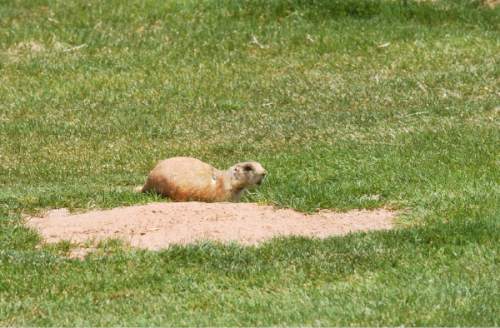This is an archived article that was published on sltrib.com in 2015, and information in the article may be outdated. It is provided only for personal research purposes and may not be reprinted.
Nine states have stepped into a lawsuit over the Utah prairie dog to support a ruling that animal activists say threatens to undermine the Endangered Species Act.
The attorneys general asked an appeals court to uphold a ruling striking down federal protections for the Utah prairie dog on private property. They argued that federal authorities shouldn't be managing animals that live only within state borders.
But U.S. Department of Justice attorneys say that the majority of protected species live only in a single state and courts have long upheld federal authority to protect them wherever they live.
The federal government is appealing a ruling from U.S. District Judge Dee Benson, who sided in November with southern Utah residents who said that federal rules protecting the threatened species were allowing prairie dogs to overtake their town. The property owners from Cedar City said the small, burrowing animals damaged the golf course, airport and cemetery and interrupted funerals with their barking.
Utah's attorney general supported the Cedar City residents Thursday with a friend-of-the-court brief filed before the Denver-based 10th U.S. Circuit Court of Appeals. It contends that Utah's rural communities are hurt by the "uncontrolled proliferation" of the Utah prairie dog.
The brief was signed by state attorneys from Alaska, Arizona, Colorado, Idaho, Kansas, Montana, South Dakota and Wyoming.
An attorney with the group Friends of Animals said the states are among a minority that oppose federal protection for threatened and endangered animals.
"Sadly, they each have a history allowing animals to die within their borders for even minor economic gain," Michael Harris wrote in an email to The Associated Press. "Luckily, 41 other states have chosen to rebuff this outrageous attempt to undermine the federal Endangered Species Act."
Animal-rights groups say Benson's ruling was a radical departure from 40 years of animal protection under the Endangered Species Act. Federal attorneys and animal-rights groups taking part in the lawsuit are due to respond this summer.
The Utah landowners filed a lawsuit with the help of the Sacramento, Calif.-based Pacific Legal Foundation. Lawyers for the group argued that because the Utah prairie dog is found only within the state, federal authorities shouldn't be able to regulate it on private property.
That argument hadn't gotten much traction in other courts before Benson's decision.
But if the appeals court upholds the ruling, it could bring the Endangered Species Act before the U.S. Supreme Court, according to the brief filed Thursday.
Utah prairie dog numbers dwindled to about 2,000 in the 1970s as they were targeted by ranchers and farmers who believed the animals competed with livestock and crops, according to court papers.
The species' numbers have rebounded significantly since coming under federal protection, though the majority live on private land.
After Benson's decision was handed down in November, Utah wildlife authorities adopted a new plan that allows the roughly 6,000 prairie dogs to be moved off private land or killed.
While the new state regulations are similar to the federal rules, state officials say they allow more of the animals to be removed from private property.



